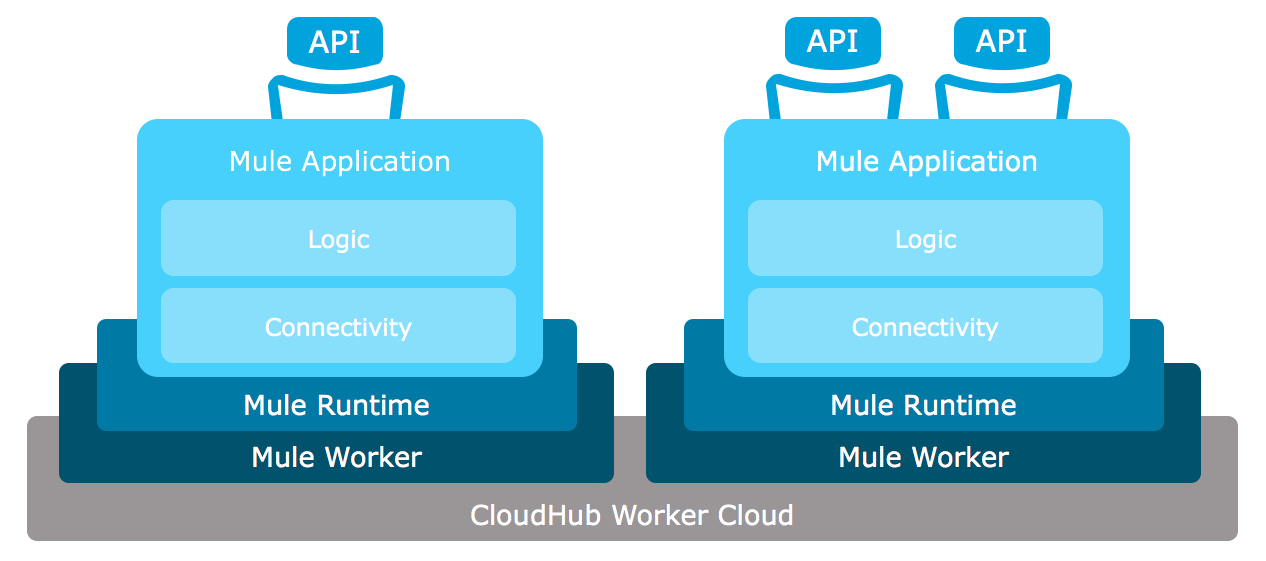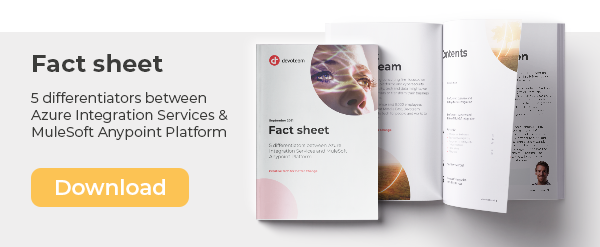In this article, we are looking at hosting flexibility and hybrid deployment solutions in both MuleSoft Anypoint and Azure Integration. What are the different options?
MuleSoft
MuleSoft Anypoint could be deployed on VM-s since very early versions, with the CloudHub option added in later versions. Self-hosting as a Docker container is now also possible. A Mule app can also run on servers without internet connectivity. Another offering is the dedicated managed Kubernetes-based container platform (‘Runtime Fabric’) which can give some of the Cloud elasticity benefits on-premise. All deployments (on-premise and Cloud) are managed and monitored from a single management plane.
All hosting options use the same Mule runtime for each application. This means that migration between the deployment options is very easy. For all hosting options (including Cloud hosting), the infrastructure is allocated in advance, with a minimum of 0.1 vCore. Both horizontal and vertical scaling options.

Azure
The traditional multi-tenant Logic Apps cannot be hosted outside of Azure; for the single-tenant Standard Logic App, it is also possible to deploy as a Docker container on its own infrastructure. There are still some runtime Azure dependencies (e.g. storage) so it is intended for servers that are internet-connected. A variant with a runtime completely independent of Azure (‘Azure Arcenabled Logic App’) is now in preview. Also, not all connectors are available for self-hosted deployment.
For hybrid deployments, Azure offers several options: one is setting up a site-to-site VPN, another one for accessing on-premise systems is to install an ‘on-premises data gateway’ component on an on-premise server. For API Management there is a ‘self-hosted gateway’, which could also be deployed as a Docker container (‘Azure Arc for API Management’). Reliable messaging (Service Bus) is not yet offered for self-hosting.
Logic App also offers a true serverless hosting option (‘Consumption plan’) which allocates infrastructure automatically to handle all incoming requests.
Conclusion
Both platforms have various options for hybrid deployment scenarios. Also, both products offer ways to deploy parts of the solution to your own infrastructure (on-premise or IaaS). For both platforms, there are differences between Cloud-hosting and self-hosting, in particular around connectors, messaging, and storage. We recommend investigating these differences to understand your options for migrating between hosting options.
Devoteam can help you evaluate Integration products based on the requirements that are important to your organization. Any questions or would you like to receive more information about our Integration & API services? Don’t hesitate and reach out to us.
Devoteam’s Integration consulting services
Building on 20+ years of extensive Integration experience at both multinationals and SMEs, we support our customers with Integration technology services. Our experts cover the full spectrum of skills, experiences, and proven approaches needed for the Integration of processes regarding customers, services, products, and operating models. In short, we enable seamless ecosystem connectivity for your entire value chain. We enable organizations to easily connect with their prospects, customers, suppliers & partners by:
- Setting up (hybrid) Integration platforms, from architecture to configuration
- Taking care of your Integration environment through a managed services model with different support levels
- APIs & API Management
- Electronic Data Interchange (EDI)
